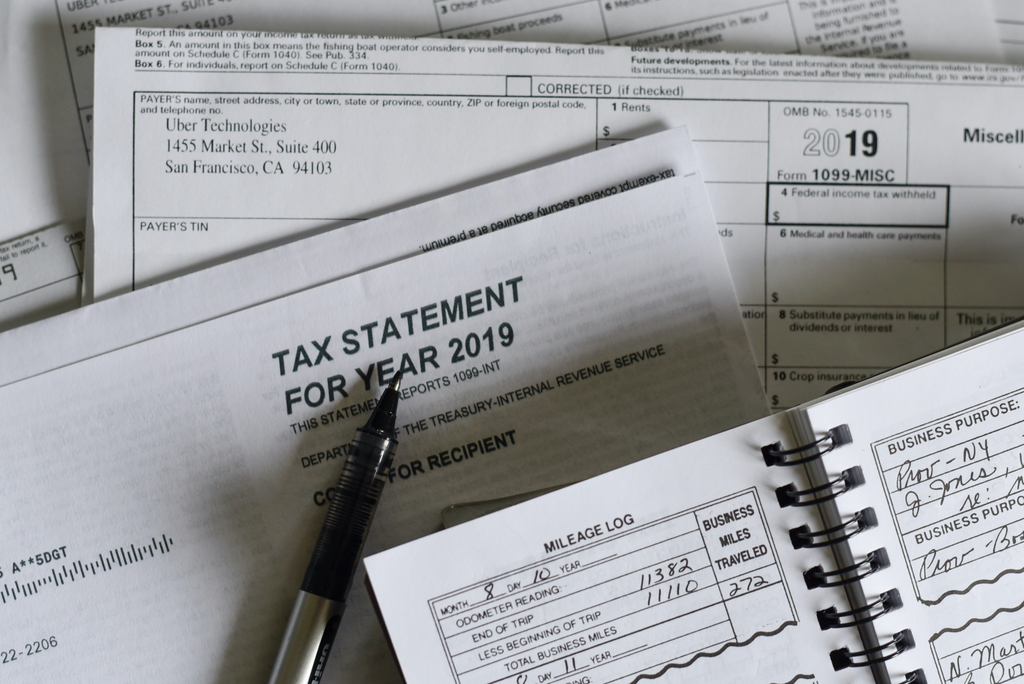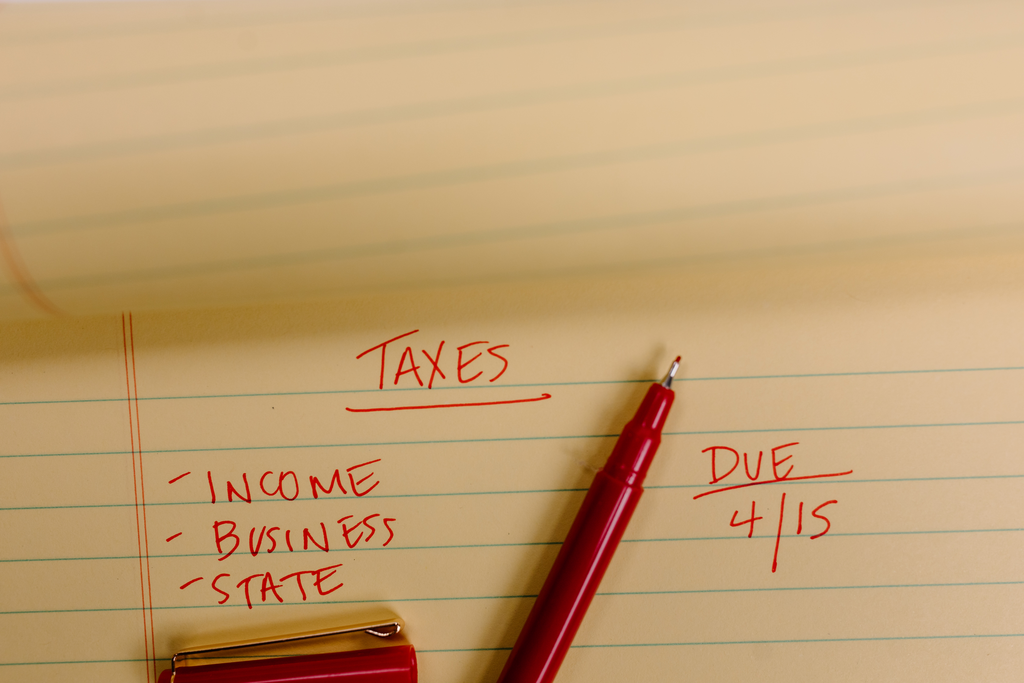You’ve just finished working on your taxes and discovered something that makes your stomach churn. You can’t pay your tax bill. You owe a lot of money to the IRS that you don’t have. What happens if you don’t pay tax?
Will you go to jail? Is the IRS going to take your house? All of these terrifying scenarios run through your mind.
Take a deep breath. You’re going to be okay. You’re not going to jail. The IRS is not going to take your house. Your unpaid taxes will get taken care of and you’ll get on with life.
How can we say this with such confidence? You’re not the first person who can’t pay their tax bill. Every year millions of Americans can’t pay their taxes. The IRS knows this, and it’s why they give taxpayers lots of options to take care of their tax debt.
In this article, we’ll break down everything you need to know about what happens if you don’t pay your taxes, different ways you can pay your taxes, and strategies for getting caught up on your unpaid tax liability so you don’t have to worry about any of those terrifying scenarios you were thinking about coming true.

What Happens if You Don’t Pay Taxes?
If you file your tax return but aren’t able to pay your income tax you will receive a failure to pay penalty.
The failure to pay penalty is 0.5% per month up to 25% of your unpaid taxes. The good news is you avoided the failure to file penalty which is even more costly. If you take action and set up a monthly payment plan, the IRS will lower your failure to pay penalty to 0.25% per month until your tax return bill is paid in full.

What Happens if You Don’t File Your Taxes?
Believe it or not, not filing your taxes is worse than not paying your taxes in the eyes of the IRS. The tax filing deadline is typically April 15 each year. Not filing taxes is technically illegal. So even if you can’t pay what you owe the IRS still wants you to file. If you can’t pay you can ask for a filing extension.
Filing a tax extension is free, easy, and automatic. Just submit Form 4868 electronically or on paper by the filing deadline.
An extension gives you another six full months to get your affairs in order before you file. However, keep in mind that you still have to pay by the original tax deadline.
You might wonder how you can pay before you complete your tax returns. The IRS wants you to make an estimate.
There’s really no way to avoid paying taxes but there are some different strategies along the way that can give you more time and help you avoid certain penalties and interest.

What are the Failure to File Penalties?
If you don’t file for an extension, or fail to file by the extended deadline, you will start to face penalties and interest. Failure to file penalties results in a 5 percent penalty each month on any unpaid taxes and cap out at 25% of the total tax liability. Here is the breakdown:
- First month: 5% of tax liability
- Second month: 5% of tax liability, (after 60 days of being late, the minimum failure to file penalty is $435 or 100 percent of your tax liability, whichever is less)
- Third month: 5% of tax liability
- Fourth month: 5% of tax liability
- Fifth month: 5% of tax liability
There are some rare cases, including natural disasters and military service, that the government will forgive unfiled tax returns. Unless you fall under one of those exemptions, expect to pay the penalty.

What Happens if you Haven’t Paid Taxes in Years?
If you haven’t paid taxes in years. the IRS may seek to recover tax payments from you in a number of ways. They can garnish your wages from your paycheck, place a lien on your home or other assets, or come directly for your bank account. The IRS can also withhold future tax returns until your tax bill has been paid down.
If you owe taxes that add up to more than $55,000 the government can even refuse to issue you a passport. The IRS can refer your outstanding tax payment to a private collections agency who is much more aggressive in trying to recover funds.
There is a 10-year statute of limitations worth knowing about. This means in most cases, the IRS can’t pursue taxes owed that go back past a decade.

Can You Go to Jail for Not Paying Your Taxes?
You can’t go to debtors’ prison for not paying your taxes, the United States outlawed debtors’ prisons in 1833. However, if you have a tax bill and aren’t making an effort to pay it, the IRS can take several of what they call “enforcement” actions. These actions include wage garnishment, levies, and property seizures.
On the other hand, if you deliberately hide large sources of income, lied on your tax returns, or didn’t file a return to avoid paying taxes, you can be found guilty of tax fraud or tax evasion. These scenarios are considered criminal offenses and if charged and found guilty you can go to jail depending on the severity.

IRS Collection Process When You Don’t Pay Taxes
When you don’t file or pay your taxes the IRS will start sending you collection notices. The severity of each notice increases over time. After the final notice for payment through mail and by telephone, the IRS will start enforcing its legal right to collect. The IRS has a lot of power and authority, and a wide range of tools available for collecting owed taxes. If they find money or assets, they can take them from you with or without your approval.
Tax Liens
A lien is a legal claim against your property. The word “property” is defined as anything and everything that you own including your home, car, business, bank account, retirement account, etc. A tax lien stops short of giving the IRS ownership and control of your assets, so they cannot use a tax lien to tow away your car or take possession of your house.
Tax Levies
With a tax lien, the IRS does not actually take ownership or possession of your property. A tax levy, on the other hand, is when the IRS does take ownership of your property. It can legally take almost anything you own, and sell your belongings to pay off the debt.
Asset Seizure
Assets seizure is the term that describes personal property the IRS can seize and then sell to pay off your debt. It includes but is not limited to property like cars, boats, homes, luxury items, businesses, vacation properties, and other real estate.
Bank Levies
The IRS prefers seizing bank accounts when possible. The seizure of a financial asset is often referred to as a “bank levy.” Bank levy seizures include checking and saving accounts, pensions, IRAs, 401(k)s, stocks, bonds, and cash value of life insurance policies.
Wage Garnishment
Wage garnishment is when the IRS takes money out of your paycheck to pay off the tax debt over a period of time. With this collection tool, you never receive the money as your employer is required to pay the IRS each pay period and deduct the amount from your take-home pay. The garnishment continues until the entire debt is paid.

What to Do if You’re Behind on Taxes
If you have fallen behind on your taxes or haven’t paid in years, there are a number of steps you can take to stop the accumulating interest and penalties and get back on track.
Determine Your Liability
The first step to getting caught up on back taxes is getting a clear picture of what you owe. You can determine this by requesting your transcripts from the IRS. Even if you haven’t filed your taxes in years, you will be able to see how much the agency believes you owe based on the information it has access to.
File Your Taxes
Contact your employers and ask for a copy of your tax returns. They should have them available and be able to send you hard copies. After you file, you may even have an old tax refund waiting for you that can help reduce your overall tax bill.

What to Do if You Can’t Pay Your Taxes
The first thing you should do if you can’t pay your taxes is to acknowledge it and understand you have a lot of options. Don’t fear the unknown, millions of people have been in the same situation and come out on the other side just fine. The following are the major steps to take if you can’t pay your taxes.
Step One: File on Time
Even if you can’t pay, you still need to file. If you have tax software you can use that, or work with a tax professional. A tax resolution expert may be able to find credits and deductions to lower your tax bill. When you owe the IRS, every dollar counts and filing your taxes late only makes things worse.
Remember, a tax extension does not give you more time to pay. It simply gives you more time to file. If you pay late, you’ll have to pay interest and penalties.
Step Two: Pay as Much as You Can
If you have extra savings it’s wise to tape into that. You can take out an equity loan on your home. Maybe you have an extra car you never use. Perhaps a family member can spot you the cash. Pay as much as you can now as it will save you on interest fees and build momentum.
If you’re out of work and can’t pay anything, that’s okay. The IRS understands that you must take care of your basic living costs first.
Step Three: Consider an Installment Agreement
After the tax deadline passes, you’ll have another month or two before the IRS contacts you about the rest of your taxes owed. Keep paying what you can during that time.
If you can’t pay it off during the extra months, think about getting a payment plan which the IRS calls an installment agreement. These are flexible agreements that allow you to pay off your tax debt over a set period of time.
The IRS offers a short-term plan (120 days or less) for bills that are less than $100,000. Long-term plans are also available for balances less than $50,000. A long-term plan will require a set-up fee ranging from $30 to $130 in most cases. However, the fee can be waived if you qualify for low income.
Step Four: Hire a Tax Relief Expert
The first three steps are the best place to start, but don’t work for everyone. If you can’t set up a payment plan yourself or just don’t want to navigate all of the paperwork, hiring a tax expert can make the process go a lot smoother.
Payment plans don’t work for everyone. You may qualify for an offer in compromise, innocent spouse relief, or tax penalty abatement.

How a Tax Debt Relief Company Can Help
Although the IRS offers a number of forgiving ways for taxpayers to address back taxes, navigating the individual programs on your own can still be a challenge. The eligibility requirements for each option can be complex, and communicating with the IRS can take weeks or months of effort.
One of the biggest challenges of working alone is providing the exact information the IRS asks for in a format they find acceptable. Sometimes you think you’re providing the right documents, but the IRS wants something else. The IRS does not have the best reputation for clarity.
The easiest and most stress-free way to deal with the IRS and free yourself from the burden of tax debt is by working with an experienced tax expert that’s done it thousands of times. They’ll know all the documents you need to provide when applying for any of the IRS programs and how to submit them. And as they help you put your case together there’s a good chance they’ll dig up some deductions you missed that could pay for their services.
Every American taxpayer has rights, which are outlined in the IRS Taxpayer Bill of Rights.
The key rights include the right to:
- Be informed
- Receive quality service
- Pay no more than you owe
- Challenge the IRS and be heard
- Finality
- Privacy
- Appeal the decision of the IRS
- Retain representation
- Confidentiality
- A tax system that is fair and just
Lorem ipsum dolor sit amet, consectetur adipiscing elit. Ut elit tellus, luctus nec ullamcorper mattis, pulvinar dapibus leo.
Evaluate
To get started you can schedule a free consultation. During your consultation, you’ll talk with one of our tax professionals about your tax problem. The consultation can help you see if you’d benefit from the services we offer. It also gives us a chance to get to know your situation more and to start the process of designing a solution to get the best outcome.
Plan
After we have clarity on the details we create a plan that satisfies the IRS and works best for you. If we find ourselves in a negotiation situation with the IRS we can put together a reasonable repayment plan showing the IRS you can pay or can’t pay depending on your unique circumstances. If your wages are being garnished we find a solution to stop that in most cases.
Communicate
Much of successfully dealing with the IRS comes down to communication and recording that communication to show you’re making an effort to comply. The Taxpayer Bill of Rights gives you the right to representation. We can be the go-between or mediator between you and the IRS. You don’t have to deal with the IRS on your own. The Tax Hardship Center understands what you’re up against, and we do everything to educate and ensure you get the best possible outcome with the least amount of stress.








